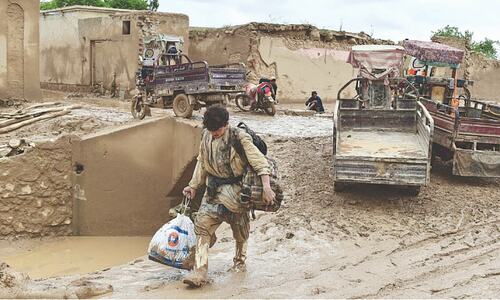“Welcome to the chicken farm,” says law enforcement trainer Dave Newton as he walks the audience through a crime scene — an otherwise unremarkable establishment, brimming with egg cartons and the belongings of the illegal immigrants who are forced to work there.
Amid workbenches and empty crates, at the head of an improvised bed, rests a bright orange suitcase with a gas heater placed in dangerously close proximity. In one corner is a kitchenette, woefully inadequate for more than a single person, while the toilet is just a bucket and some toilet paper, placed near the farm entrance.
The brief is simple — investigators have to scour the scene for any and all clues, lifting fingerprints and meticulously photographing evidence. “Only after they have exhausted all forensic methods can sleuths actually speak to the victim,” Mr Newton, a former police officer himself, tells the audience as a larger-than-life image of him in tattered clothing with egg on his vest and face appears on the screen behind him, eliciting giggles from the audience.
The presentation is about a revolutionary simulation-based training module, designed to teach law enforcement officials how to effectively probe cases involving illegally-trafficked persons and exploited labour.
As he describes the technology needed to develop the role-playing game, Mr Newton’s eyes sparkle with the excitement of a schoolboy who may as well be showing off a shiny new toy to a group of equally enthused friends.
Looking around the room, the participants of the International Centre for Migration Policy Development’s (ICMPD) workshop also seem impressed, both with Mr Newton’s ideas and his kit. They are here to discuss new and innovative means to approach the problem of trafficking in human beings, and the crime scene recreation tool seems to offer an immersive platform that is perfect for training law enforcement officers in handling such cases sensitively and thoroughly.
Developed in collaboration with the University of Bradford’s Centre for Visual Computing, the simulator has been used to train law enforcers, prosecutors and judges in around 20 countries that are worst-hit by the menace of human trafficking.
The connection to Bradford, or ‘Little Pakistan’ as it popularly known by locals, is doubly significant; according to the 2012 census, at least one in five residents is a Pakistani, or of Pakistani origin, and have roots back home. These connections often serve as the launch-pad for the lofty hopes and dreams of many young men who dream of the good life abroad.
For now, the simulator is simply an invaluable training tool for judicial officers, law enforcement personnel and customs or border patrol agents. However, Mr Newton is working on a smartphone app that will bring the game to a much wider audience worldwide, with the aim of creating widespread awareness about the problems facing victims of human trafficking.
When asked just how much impact the simulator has had on those who have already been trained through it, Mr Newton isn’t overly gushing. “When it becomes available on smartphones as a game, we will be better able to gauge regarding whether or not this has actually increased sensitivity among trainees, or has helped actions on the ground. But at the moment, its main benefit is the creation of empathy: putting people in the shoes of trafficking victims and immersing them in the hostile environments that such individuals have to make do in.”
His assessment is oblique for a reason. Across the globe, the distinct-yet-connected issues of human smuggling and trafficking in human beings are too often conflated, much to the detriment of the victims themselves. Most are seen as opportunists who have left their countries to make it big elsewhere, but this perception couldn’t be farther from the truth.
Across the world, migrants and refugees belong to some of the most impoverished and vulnerable segments of society. Most have no home or homeland to return to, as in the case of Myanmar’s Rohingya, and the multitudes of Yemeni or Syrian refugees who have poured into Europe and Asia from the Middle East in their hundreds of thousands.
But everywhere they go, they are met with resentment, hostility, or at best, incompetence or insensitivity. “Investigators are usually very ill-equipped to deal with trafficking victims, and in most court cases, they are made to face the very people who exploited them, which is the worst possible form of trauma they can be subjected to,” says Bosnian social worker Amela Efendic.
In other cases, victims’ rights are violated by the media itself. Overzealous reporters in search of a story can often do more harm than good, says Humera Azam from Pakistan’s Ministry of Human Rights.
In her opinion, the simulation tool developed by Mr Newton and his team can be an invaluable resource for training Pakistan’s law enforcement and judicial staff, who are — at best — ill-equipped to deal with the complex challenges posed by any investigation involving the victims of human trafficking.
“Until officers of the law can learn to empathise with victims and new legislation can provide adequate protections for them, the ‘wretched of the earth’ will continue to face discrimination, persecution and exploitation at the hands of unscrupulous traffickers,” concludes Mr Newton.
Published in Dawn, December 8th, 2017















































Dear visitor, the comments section is undergoing an overhaul and will return soon.